Top 10 Shopify CRM Tools & Integrations to Improve Your Sales
Summer Nguyen | 09-19-2024

The phrase “Customer is king” is more important now than ever because customers today know exactly what they want from a product or brand. Sales teams have to balance keeping current customers happy while also attracting new ones. By understanding what customers have bought before, marketers can turn potential web browsers into loyal customers and encourage them to keep coming back.
However, managing large amounts of customer data to provide a personalized experience can be challenging for ecommerce businesses. With 83% of customers open to sharing their information for personalized services, even a minor error can spoil the experience.
CRMs (Customer Relationship Management systems) are the best solution for managing customer data and tracking interactions. When your team has all the details in one place, they can handle relationships more effectively.
Shopify is a strong ecommerce platform, and integrating it with a CRM can elevate your business. With a Shopify CRM, you can:
- Improve lead conversion
- Boost brand awareness
- Address customer concerns after the sale
Keep reading to learn how a Shopify CRM can benefit your ecommerce business.
Benefits of integrating a CRM into your Shopify store
Ecommerce businesses, whether small startups or large companies, must not only attract new customers but also keep and nurture their existing ones. A Shopify CRM acts as a central hub to help with this.
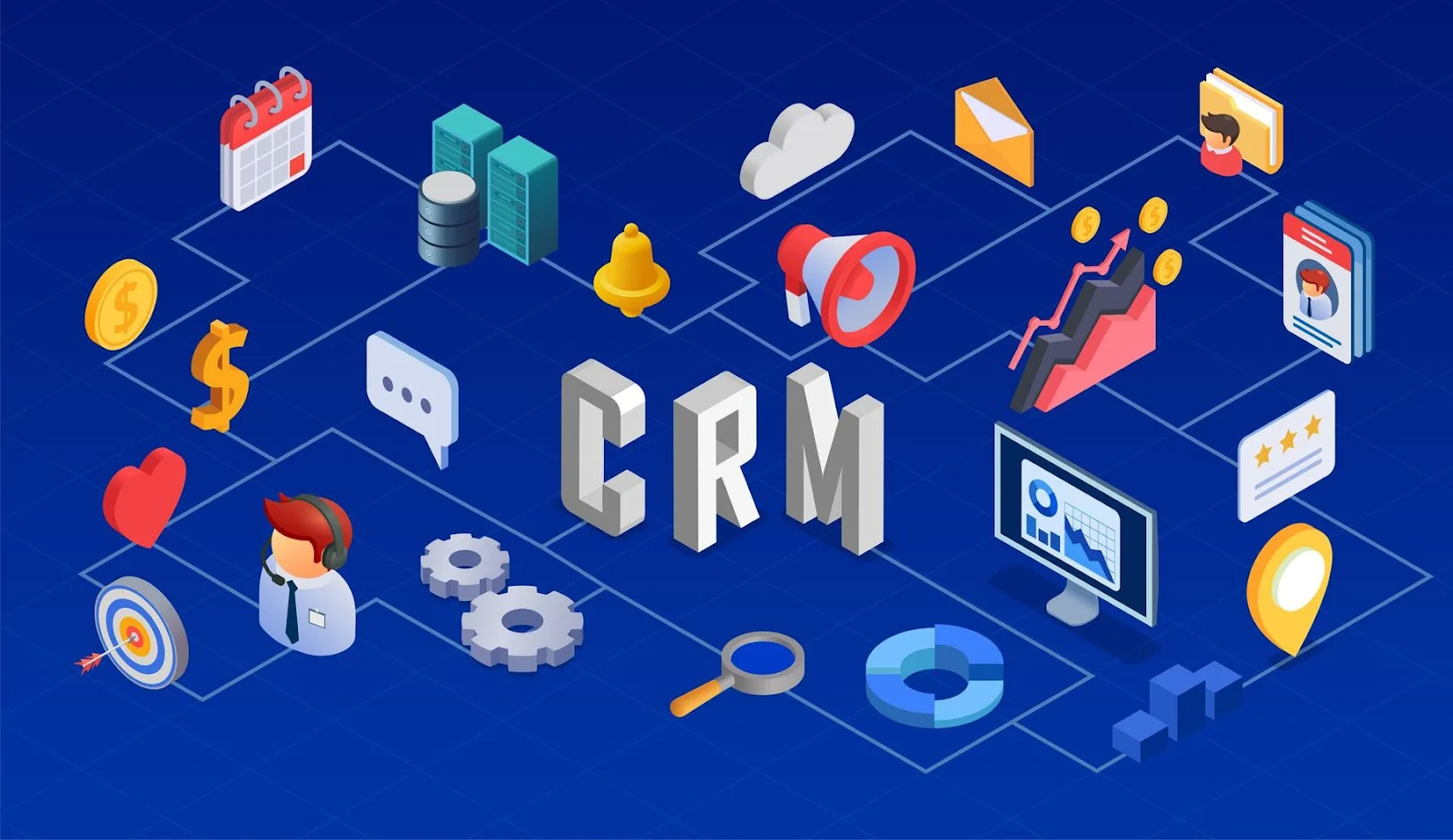
If you’re unsure why you should integrate a CRM with your Shopify store, consider these key benefits:
1. Centralized Customer Data
A CRM helps you gather, organize, and centralize customer information, from contact details to past interactions. This makes it easier to understand your customers and tailor your marketing and sales strategies.
2. Customized Customer Engagement
A CRM enables you to categorize your customers based on various factors like demographics, buying habits, and preferences. This enables personalized marketing campaigns and product recommendations. You can also track customer inquiries and complaints to provide more personalized support, ensuring no customer is overlooked.
3. Enhanced Cross-Selling
With a CRM, you can analyze customer behavior and preferences to proactively address their needs. By targeting customers based on their purchasing habits, you can boost conversions and increase the average order size.
4. Streamlined Team Collaboration
When a CRM is used by every member of your team, it ensures that all team members are on the same page, even when workflows change. Information entered into the system is shared across the team, enhancing overall efficiency.
5. Automated Routine Tasks
A CRM can automate the routine tasks, naming sending order confirmations, abandoned cart reminders, shipping notifications, and follow-up emails, freeing you to concentrate on more strategic activities.
6. Data-Driven Insights
CRMs offer valuable insights into your business with analytics and reporting tools. You can manage essential metrics such as customer lifetime value, customer acquisition cost, and conversion rates, giving you needed info to make data-driven decisions and, therefore, enhance your ecommerce strategy.
Key Features of The Best Shopify CRM to Consider
When searching for a CRM that integrates with Shopify, you’ll find plenty of options. To pick the right one, consider your business needs and budget, and choose the CRM that best fits those criteria. Not sure where to begin? Here are some key features to look for in a Shopify CRM:
1. Social Media Interaction
According to the 2023 Sprout Social Index report, 53% of consumers report that their social media usage has increased over the past few years.
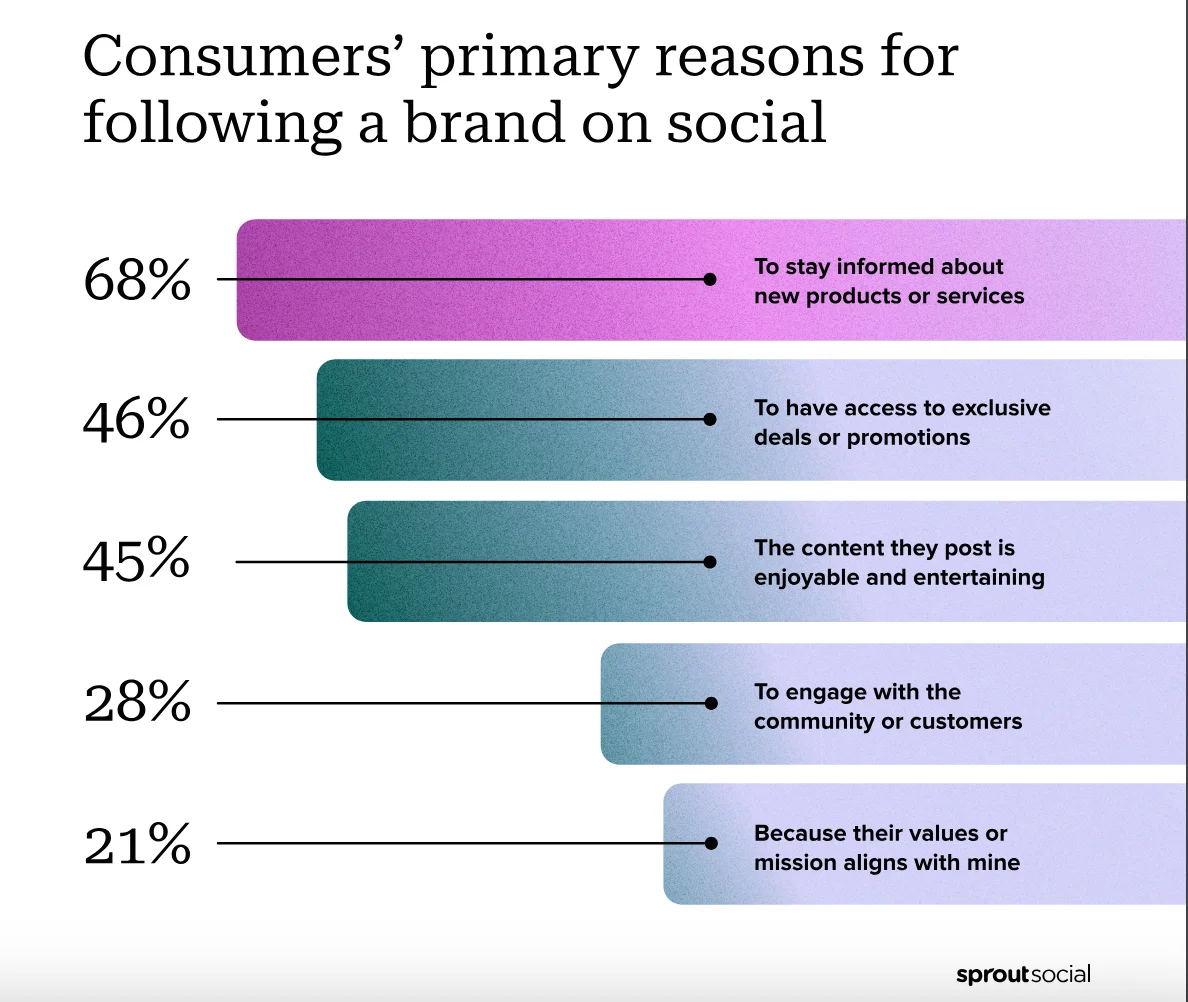 Therefore, it’s important to have a CRM that centralizes and tracks these interactions. This helps you respond quickly, connect with customers, and keep a consistent brand presence across social platforms.
Therefore, it’s important to have a CRM that centralizes and tracks these interactions. This helps you respond quickly, connect with customers, and keep a consistent brand presence across social platforms.
2. Customizable Automation
Ecommerce businesses often have varied and changing processes. Look for a CRM that offers flexible automation tools to handle repetitive tasks like sending personalized email campaigns, assigning leads to team members, or launching marketing efforts based on customer behavior.
3. Effortless Data Integration
A good CRM should integrate effortlessly with other systems, removing the need for manual data entry and minimizing errors. This ensures you have accurate, up-to-date customer information, allowing you to make informed, data-driven decisions.
10 of the Best Shopify CRMs for Your Ecommerce Business
HubSpot CRM
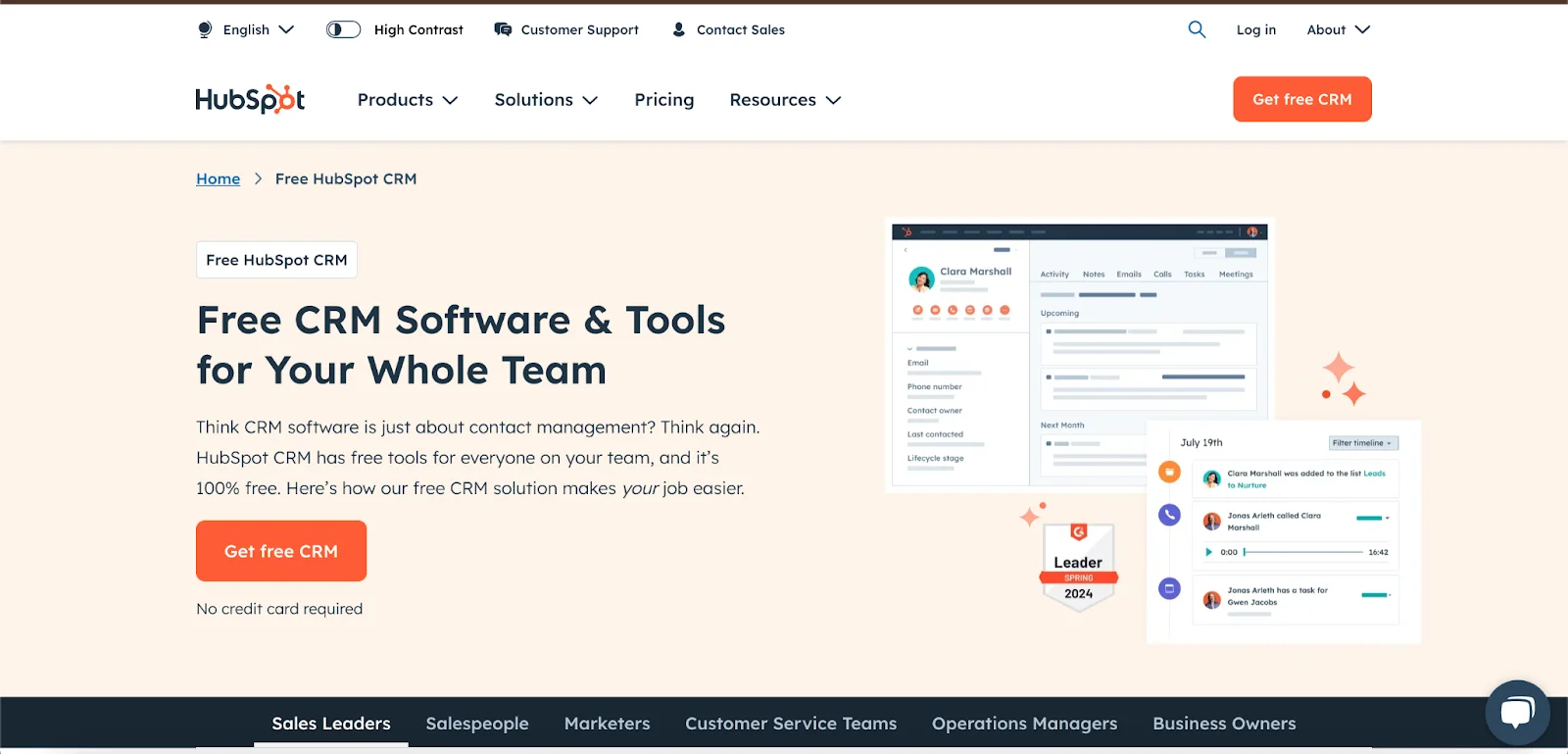
HubSpot is a popular CRM for many reasons, and its integration with Shopify is another big plus. With this integration, you can effortlessly sync your Shopify customers, products, and deals into HubSpot.
This connection offers several benefits, including smart calls-to-action (CTAs) in your content, automated abandoned cart emails, product-specific re-engagement ads, and more. Using the data from your Shopify store, you can personalize customer interactions and automate processes to ensure no lead is overlooked.
By integrating HubSpot with Shopify, you can drive more traffic to your brand and increase revenue from both new and existing customers.
Key Features:
- Analyze your Shopify data within HubSpot.
- Automatically sync products, contacts, and orders.
- Segment contacts based on the products they purchase.
- Automate ecommerce campaigns.
Pros:
- Automatically sync Shopify customers, products, and deals with HubSpot.
- Use abandoned cart emails and re-engagement campaigns to boost sales.
- Access detailed reports for better insight into your business.
- Automatically enrich contact profiles with data from multiple sources.
Cons:
- To fully benefit from HubSpot, you may need to upgrade your plan or purchase add-ons, which can be expensive.
- It may be complex for new users or small businesses to navigate.
Pricing:
- Customer Platform:
- Professional Customer Platform: Starting at $1,300 per month
- Enterprise Customer Platform: Starting at $4,300 per month
- Marketing Hub:
- Marketing Hub Professional: Starting at $890 per month
- Marketing Hub Enterprise: Starting at $3,600 per month
Zoho CRM
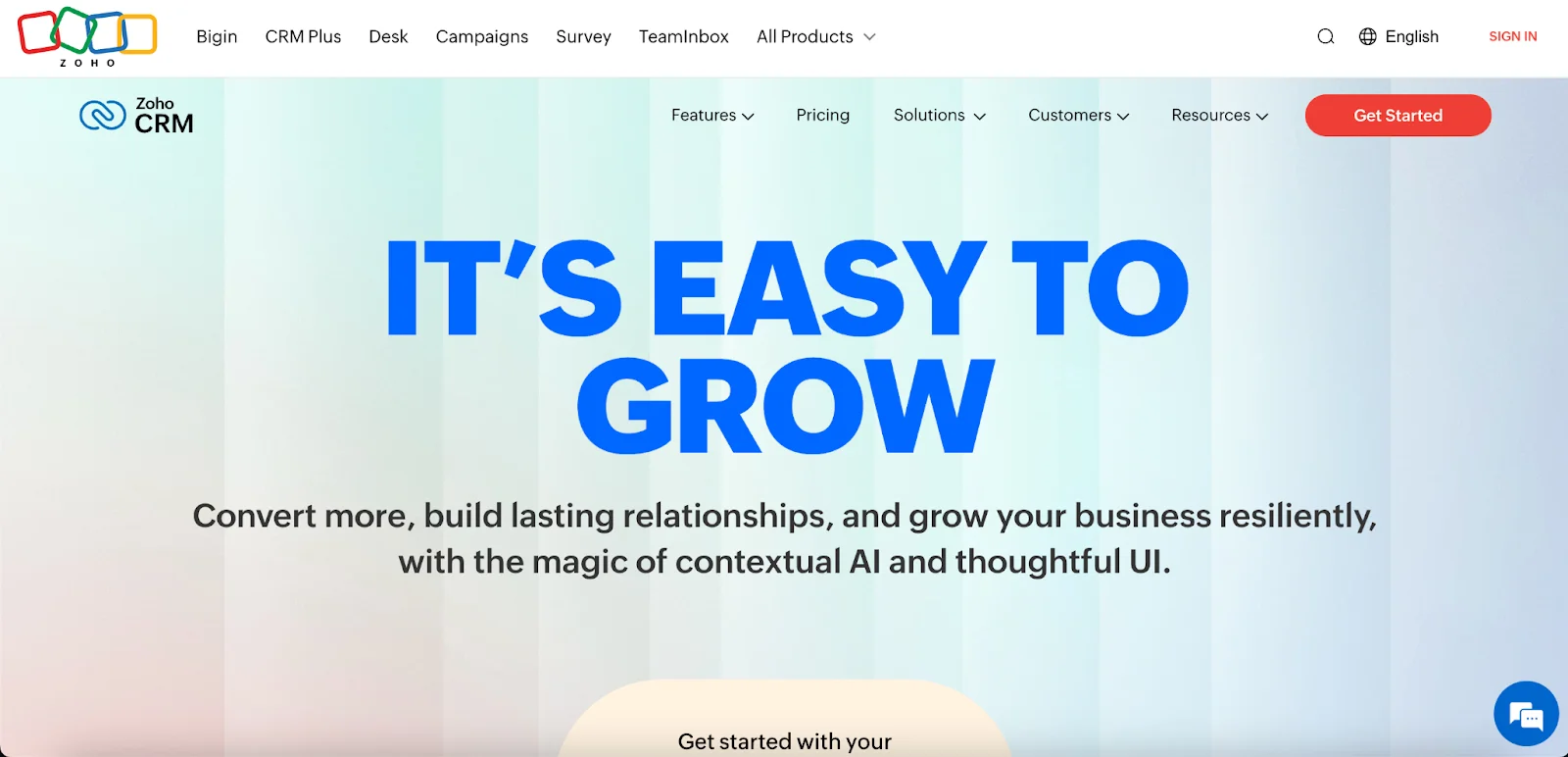
Zoho CRM is another popular option for Shopify stores that need to track customer purchases and expenses. Integrating Shopify with Zoho CRM allows you to easily synchronize customer, sales, and product information between the two platforms.
With this integration, you can transfer your order lists and details from Shopify to Zoho CRM effortlessly. The integration supports multiple stores, ensuring you never miss an order. Plus, automatic syncing means you don’t have to update information manually.
Zoho CRM automates many Shopify-related tasks for you. When you add a new item to Shopify, it’s automatically added to Zoho Inventory. Sales create sales orders and contact entries automatically, saving you time and keeping your data secure.
The batch tracking feature in Zoho CRM helps you monitor inventory movement, so you won’t run out of stock and can always offer fresh items to your customers. Zoho Inventory also tracks stock levels across multiple warehouses.
Key Features:
Automatically sync Shopify customers to Zoho CRM contacts or leads.
- Choose the direction of data sync with two-way sync.
- Manage Shopify customer records in Zoho CRM.
- View all sync details on a single dashboard.
Pros:
- Sync data from multiple Shopify stores to Zoho CRM.
- Cost-effective tools for managing inventory, price books, quotes, sales orders, and more.
- Zoho Marketplace offers various free and paid apps for Shopify CRM integrations.
Cons:
- The free plan doesn’t include Shopify integration; a paid subscription is required.
- The Shopify to Zoho CRM extension costs an additional $20 per organization per month.
- The system has a steep learning curve because of its wide range of features and somewhat intricate interface.
Pricing:
- Standard Plan: $20 per user per month
- Professional Plan: $35 per user per month
- Enterprise Plan: $50 per user per month
- Ultimate Plan: $65 per user per month
Zendesk Sell
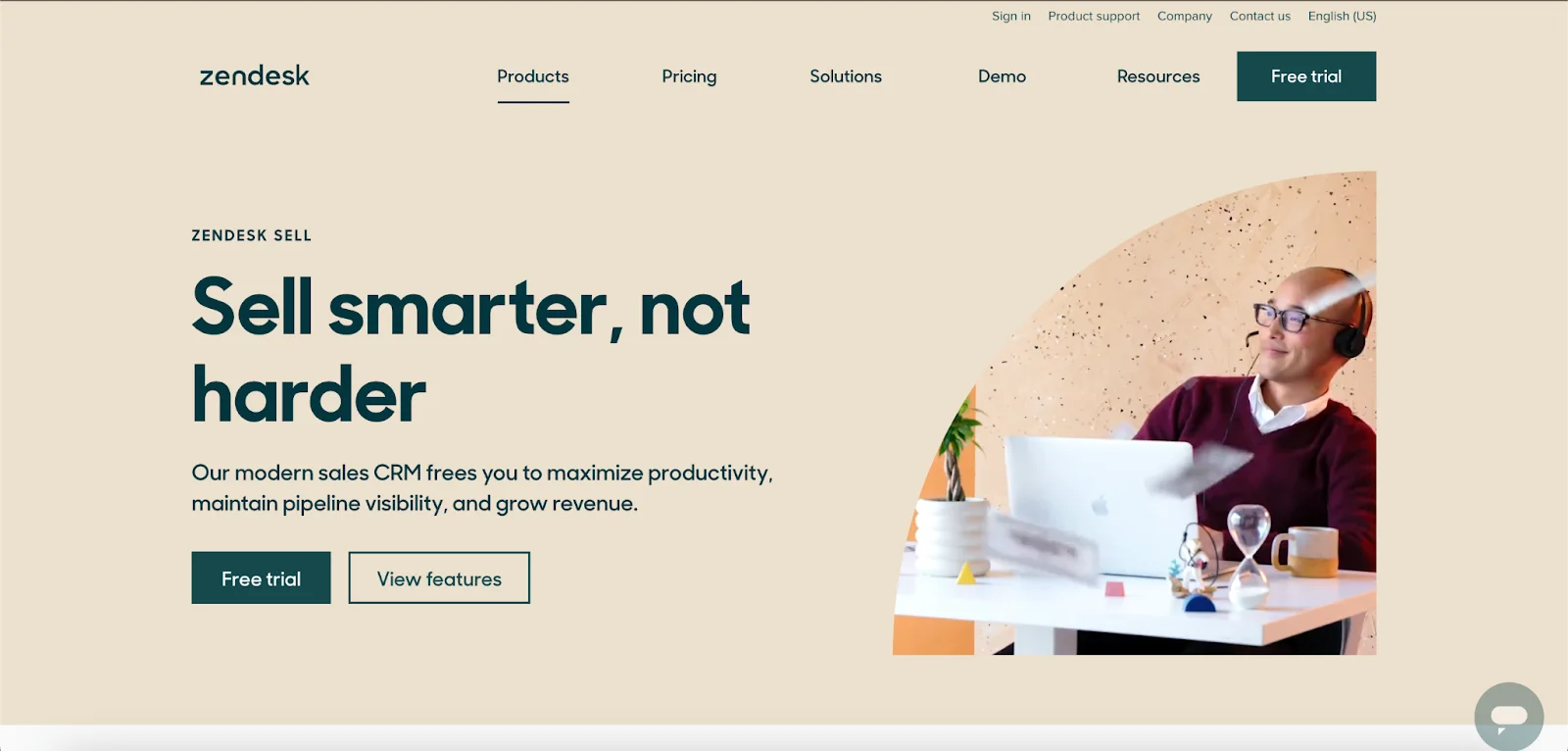
Zendesk Sell is a popular CRM choice among Shopify store owners, and it’s easy to see why. It helps manage leads and streamline sales through various communication channels.
With Zendesk Sell, sales reps can view all customer data in one place, allowing for a more personalized customer experience. They can handle refunds and cancellations, review customer details, and check Shopify orders for accuracy, all without switching between different apps.
This integration boosts efficiency by allowing reps to access order information, billing, and shipping directly within the CRM, which enhances productivity, improves customer satisfaction, and increases customer lifetime value.
Key Features:
- Access Shopify data in Zendesk for quicker issue resolution.
- Manage refunds and cancellations easily through the Support sidebar app.
- View additional Shopify data by clicking on the Order ID.
- Embed live chat on your Shopify store to improve engagement.
Pros:
- Ready-to-use email templates save time and ensure consistent communication.
- Centralized customer data facilitates more contextual conversations.
- Automated email and task sequences help engage leads more effectively.
- A mobile app keeps you updated on deals at all times.
Cons:
- Customer support can be lacking.
- The interface and functionality may be complex and challenging to learn.
Pricing:
- Zendesk Suite plans
- Suite Team: $55 per agent per month, billed annually
- Suite Growth: $89 per agent per month, billed annually
- Suite Professional: $115 per agent per month, billed annually
- Suite Enterprise: Talk to sales for a quotation
- Zendesk Sell plans
- Sell Team: $19 per agent per month, or $228 per year for 1 agent
- Sell Growth: $55 per agent per month, or $660 per year for 1 agent
- Sell Professional: $115 per agent per month, or $1,380 per year for 1 agent
Salesforce
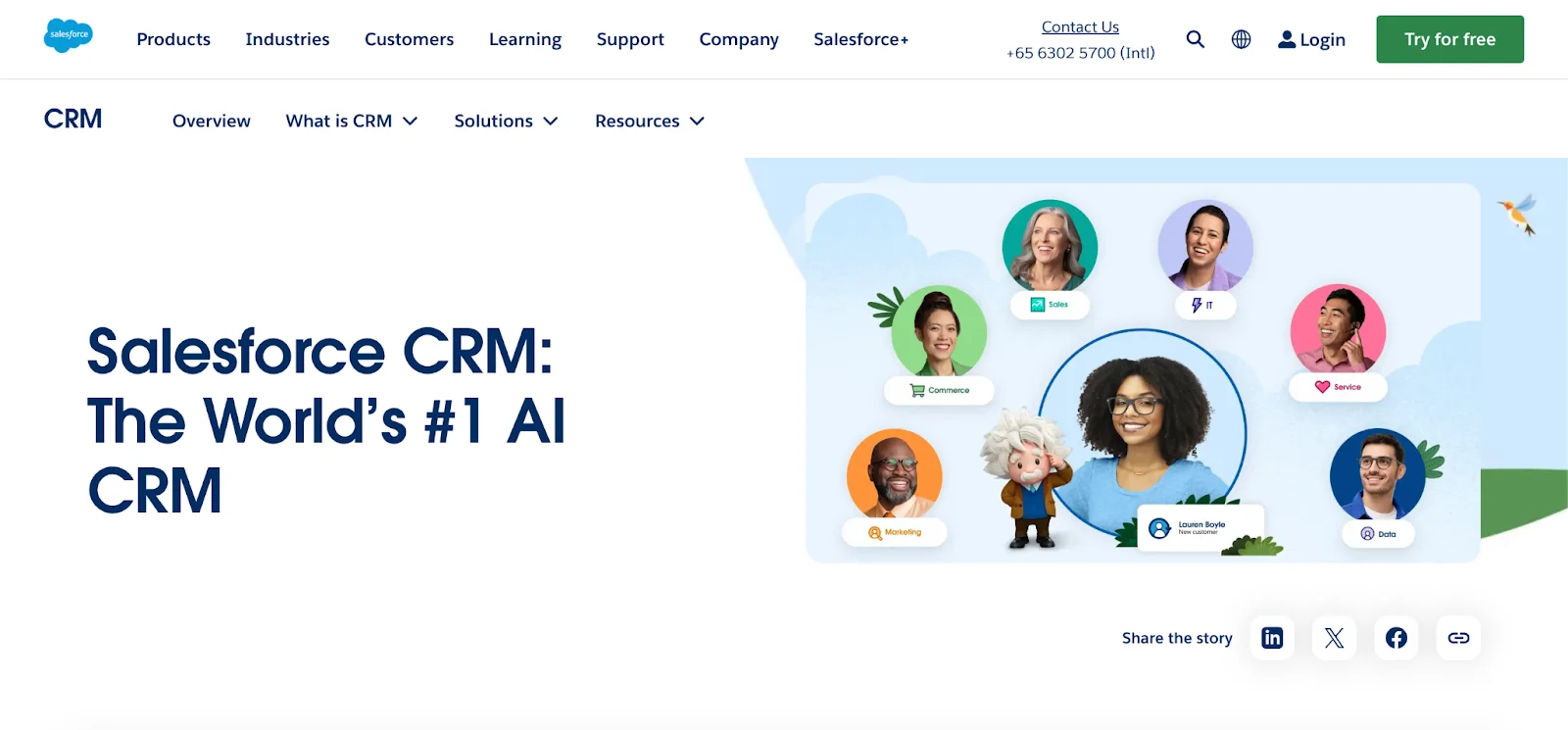
Salesforce is an AI-powered CRM tool that integrates seamlessly with Shopify to create more personalized buying experiences.
Many users praise Salesforce for its robust capabilities and consider it a top choice for Shopify CRM apps. It excels at integrating customer data from various channels, providing valuable insights that enable large-scale personalization.
Salesforce’s automation features are a significant advantage, giving you more time and efforts to focus on more strategic and creative aspects of your business. The zero-code integration with Shopify further enhances the user experience.
Key features:
- Centralize customer data for better analysis and insights.
- Personalize marketing and automates targeted notifications.
- Integrate communication tools for personalized service.
- Streamline operations by consolidating information and processes.
- Automate marketing tasks, customer evaluations, and repetitive activities.
Pros:
- Real-time data synchronization between Shopify and Salesforce.
- Automates repetitive administrative tasks, saving time and reducing costs.
- Supports syncing multiple Shopify stores with your CRM.
- Automatically creates detailed customer profiles using data from various sources.
Cons:
- Salesforce is best suited for large organizations and can be relatively expensive.
- It has a steep learning curve, which may be challenging for new users.
Pricing:
-
Solutions for enterprises:
- Enterprise Plan: $165 per user per month, billed annually
- Unlimited Plan: $330 per user per month, billed annually
- Einstein 1 Sales Plan: $500 per user per month, billed annually
-
Solutions for SMBs:
- Starter Suite Plan: $25 per user per month
- Pro Suite Plan: $100 per user per month
- Enterprise Plan: $165 per user per month
ActiveCampaign
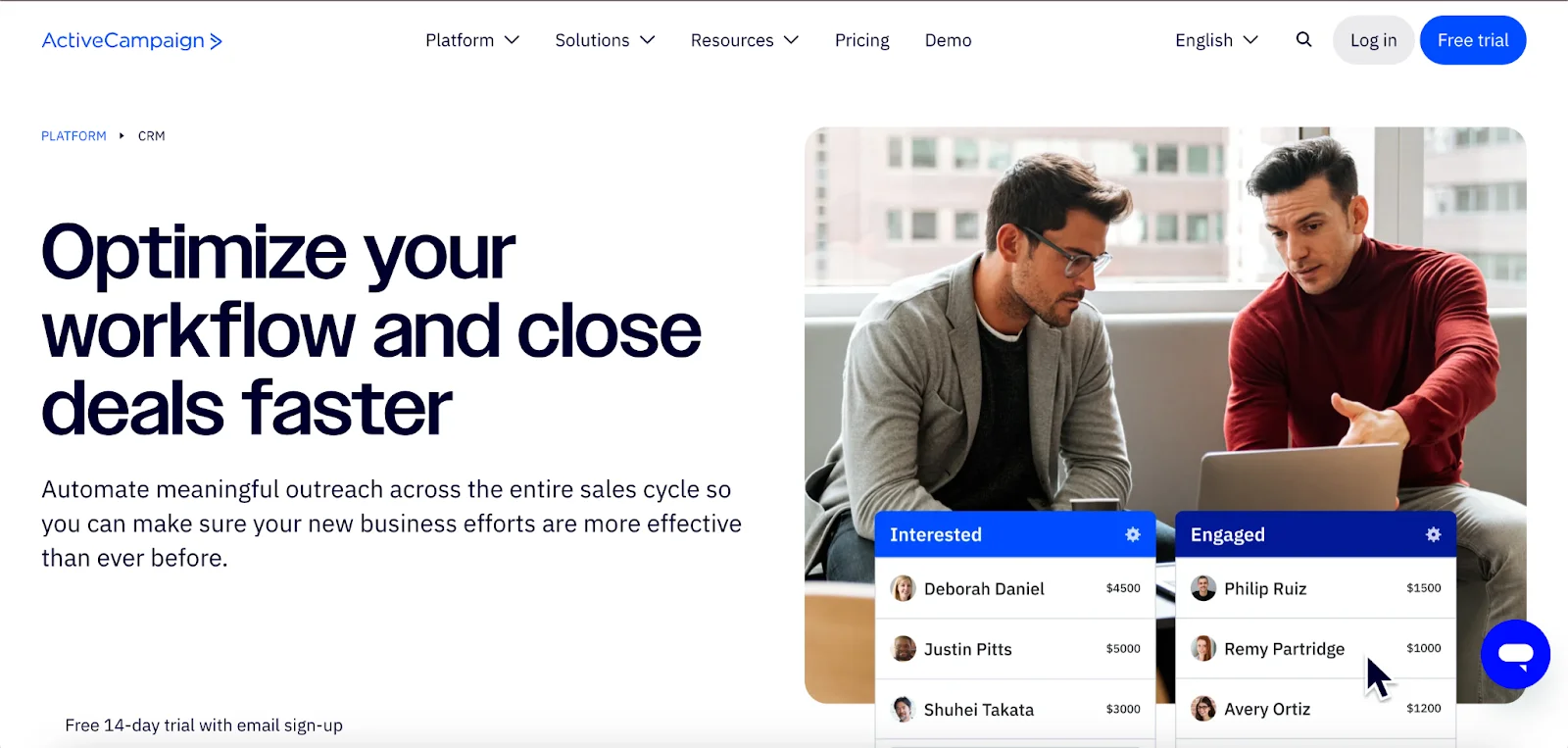
ActiveCampaign is another CRM option for Shopify that can help you track website visitors and organize your leads into different categories for more targeted marketing.
By integrating Shopify with ActiveCampaign, you can better engage with shoppers throughout their buying journey, creating better experiences that encourage repeat purchases. This integration lets you track what customers have bought and recommend future purchases based on their behavior.
ActiveCampaign allows you to set up notifications for customers about next steps and personalize your outreach to build stronger connections. This approach helps turn first-time buyers into loyal customers through timely and relevant messages.
Key Features:
- Send personalized messages and emails based on past purchases.
- Schedule email campaigns according to customer segments.
- Automate abandoned cart emails.
- Use automation for upselling and cross-selling after purchases.
Pros:
- Identifies upselling and cross-selling opportunities.
- Automated sequences for abandoned carts.
- Uses conditional content and SMS for better engagement.
- Segments customers for more personalized experiences.
Cons:
- It might be hard for new users to navigate.
- Advanced functions are available only on higher-tier plans.
Pricing:
- Starter Plan: Starting at $15 per month
- Plus Plan: Starting at $49 per month
- Pro Plan: Starting at $79 per month
- Enterprise Plan: Starting at $145 per month
Brevo
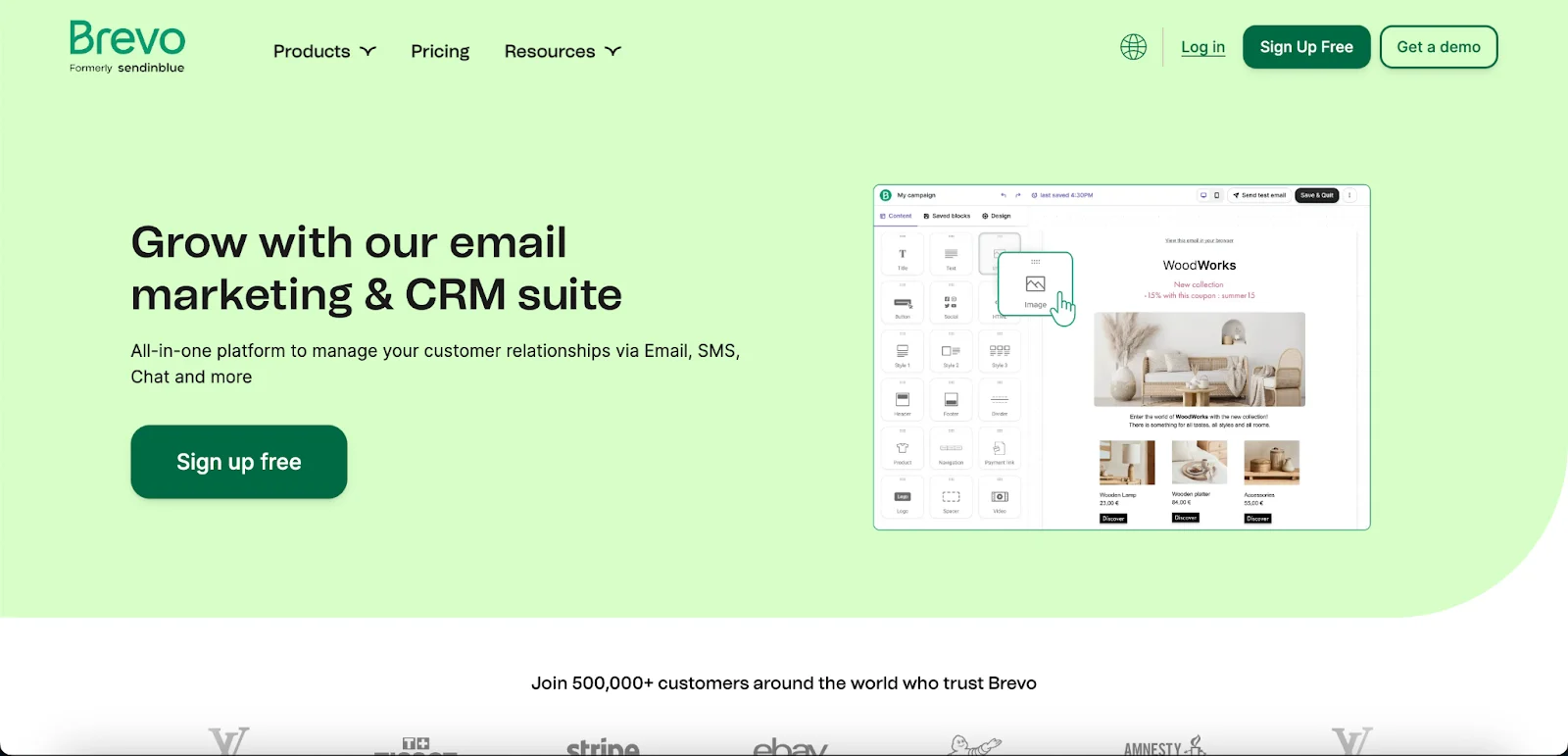
Brevo (formerly Sendinblue) is a popular CRM choice for Shopify stores, helping merchants enhance customer relationships and boost sales. It offers features like email automation, advanced reporting, and customizable templates to create effective campaigns.
Brevo also includes built-in SMS marketing and chat functions, enabling merchants to connect with customers across various channels. It allows for audience segmentation and integration with other apps to further improve the customer experience.
The integration with Shopify enables you to set up workflows based on customer activity, create time-sensitive product offers, and automate the entire process. Brevo also supports embedded forms and custom landing pages to help grow your customer list and sync your data.
Key Features:
- Seamless integration with Shopify to sync customer data.
- Automated workflows for actions like abandoned carts.
- Detailed reports and analytics for performance tracking.
- Targeted marketing based on shopping behavior and purchase history.
Pros:
- Customizable email templates with an easy drag-and-drop editor.
- Powerful and easy-to-set-up automations with customizable paths.
- Effective segmentation and personalization options.
- User-friendly interface with minimal bugs.
Cons:
- Limited reporting with advanced stats only on premium plans.
- Slow customer support with no live chat.
- Inconsistent email deliverability rates.
Pricing:
Marketing platform:
- Free Plan
- Starter Plan: Starting from $9 per month
- Business Plan: Starting from $18 per month
- Enterprise Plan: Custom price
Conversations platform:
- Free Plan
- Pro Plan: $15 per month per user
Sales platform:
- Free Plan
- Pro Plan: $12 per month per user
Agile CRM
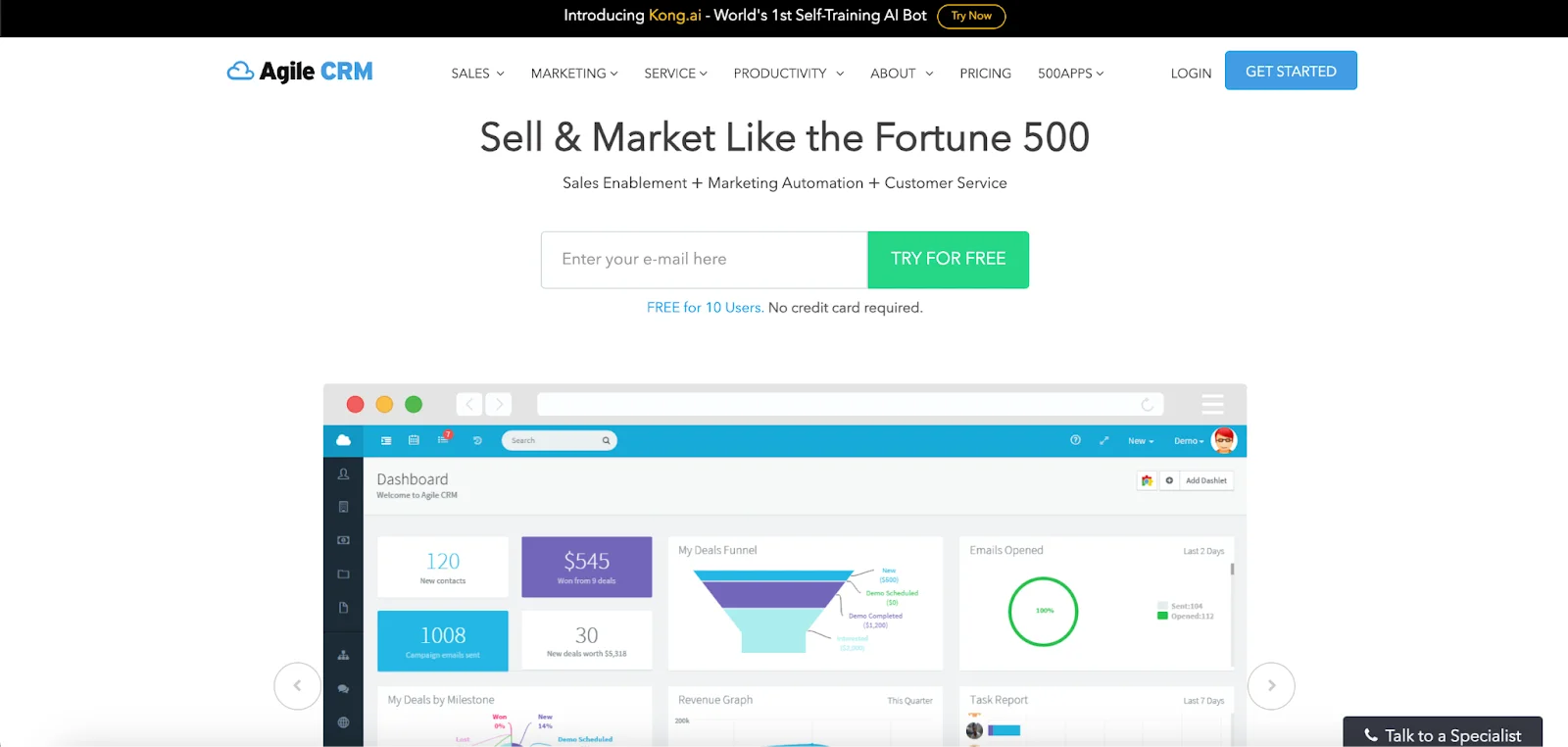
Agile CRM is a strong choice for integrating with Shopify, aimed at boosting conversions by turning customer browsing into sales. The integration automates tasks like sending email reminders, personalized newsletters, and follow-ups, and helps collect customer feedback to improve their shopping experience.
Once connected, you can synchronize data across platforms, keeping customer contacts, purchase history, and payment records organized in one place. Automated actions can be triggered based on Shopify events, and follow-ups can be automated for various in-store processes.
Key Features:
- Automate actions based on Shopify events.
- Sync data between Shopify and Agile CRM.
- Advanced web analytics at the contact level.
- Automated reminders for customers.
Pros:
- Free plan available for up to 10 users and 50,000 contacts.
- Extensive automation options and drip email marketing.
- Unlimited deals, tasks, and documents with built-in telephony and email tracking.
Cons:
- Difficulties in canceling plans.
- Steep learning curve.
- Enterprise plan needed for more than three integrations.
Pricing:
- Free Plan: For 10 users
- Starter Plan: $14.99 per user per month
- Regular Plan: $49.99 per user per month
- Enterprise Plan: $79.99 per user per month
Nutshell
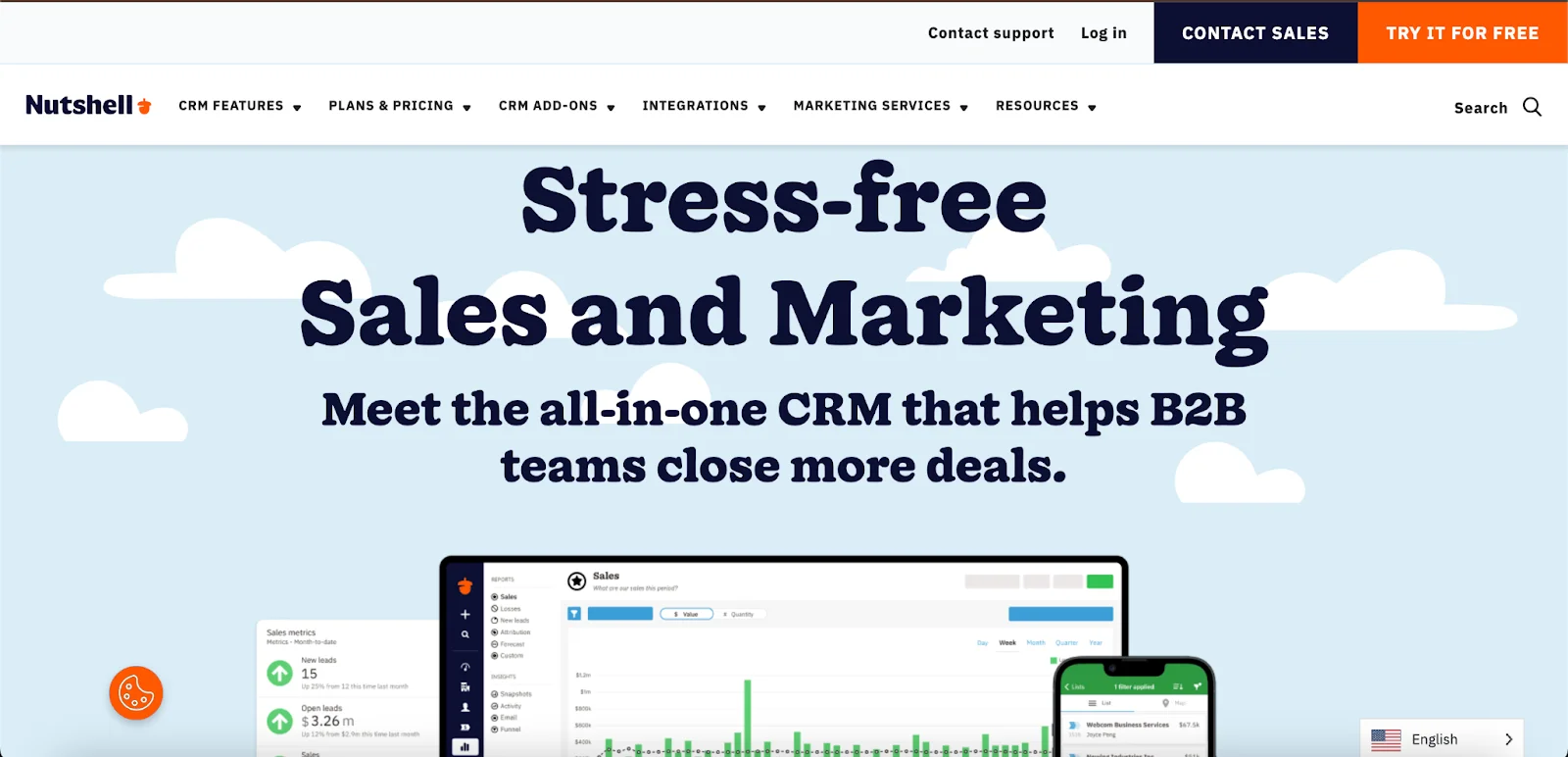
Nutshell is a well-regarded CRM for Shopify that you might want to consider. Integrating Nutshell with Shopify allows for the automatic conversion of Shopify orders into CRM leads and synchronizes product orders and customer data in real time.
This integration streamlines your workflow by converting Shopify orders into leads and contacts, making it easier for sales reps to manage and track interactions from one platform. It removes the need for manual data entry and ensures that your sales and customer service teams stay aligned.
Key Features:
- Automatically creates leads and contacts from Shopify orders.
- Transfers product data between Shopify and Nutshell.
- Tracks sales and inventory in real time.
- Enhances customer experience based on purchase history.
Pros:
- Easy-to-use interface.
- Simple contact and pipeline management.
- Provides insightful reporting and tracking.
Cons:
- Limited customization options.
- Creating leads can involve duplicate data entry.
- Slow customer support.
Pricing:
- Foundation Plan: $19 per user per month
- Pro Plan: $49 per user per month
- Power AI Plan: $59 per user per month
- Enterprise Plan: $79 per user per month
Metrilo
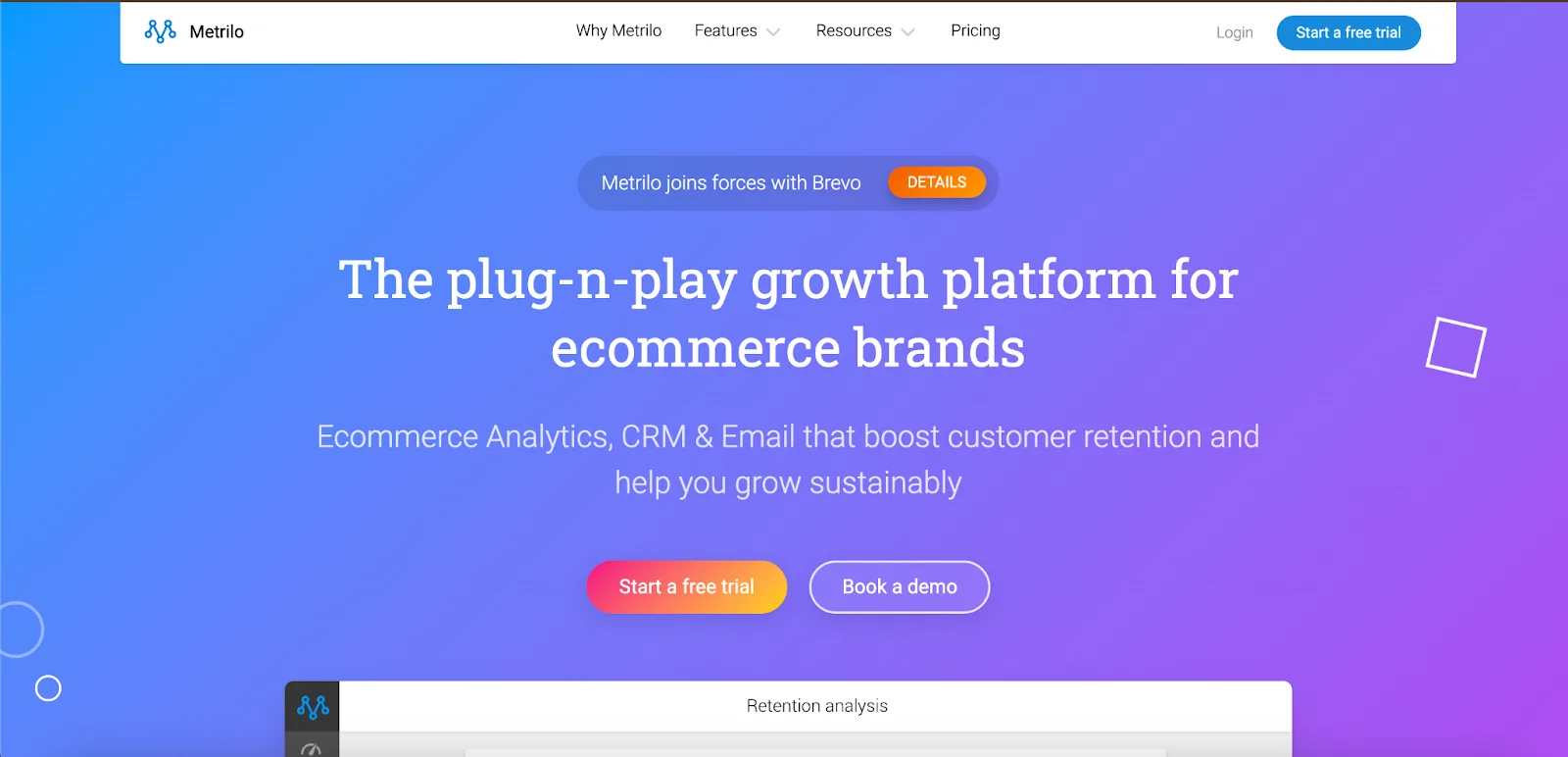
Metrilo is an effective e-commerce CRM that centralizes customer data, offering detailed profiles with behavioral patterns, order history, interactions, and lifetime spend.
It tracks various aspects of the customer journey on your website, such as page views, checkouts, and searches. Additionally, it provides product performance metrics and advanced analysis for customer retention to help with decision-making.
Metrilo also excels in email marketing with its intuitive templates and drag-and-drop editor.
Key Features:
- Categorize customer profiles by behavior, order history, and contact details.
- Detailed tracking of customer actions across visits.
- Filter and tag customers to create segments based on attributes.
- Integration with email marketing for personalized messaging.
Pros:
- Easy Shopify integration with automatic data import
- Detailed tracking of website visitor behavior and sources
- Real-time analytics for improved business performance
- Simple filtering and segmentation for targeted marketing
Cons:
- Higher cost compared to other CRM options
- Advanced features, like retention analysis and email marketing, are only available in premium plans
Pricing:
- Essential Plan: $119 per month
- Pro Plan: $199 per month
- Premium Plan: $299 per month
Pipedrive
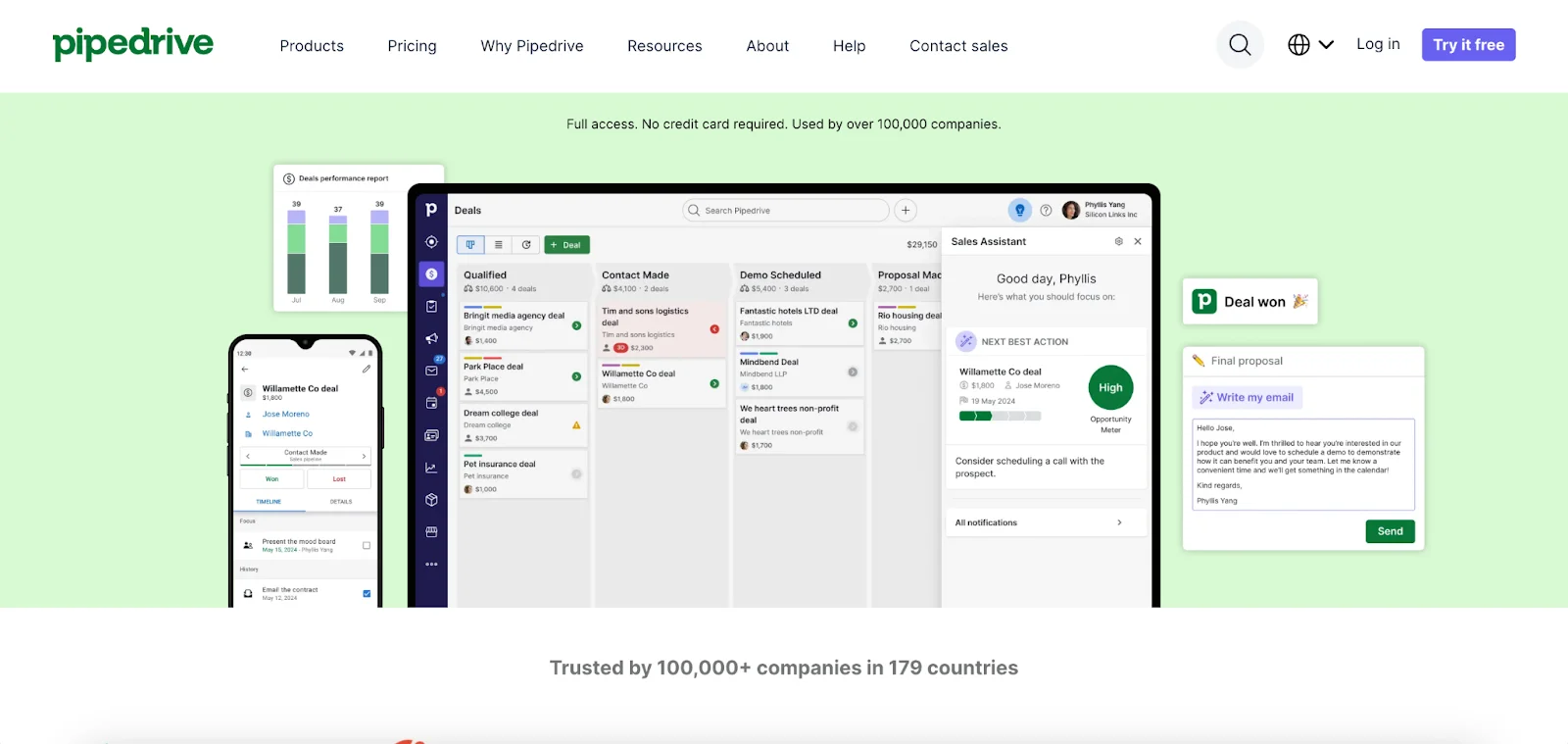
Pipedrive is a popular CRM that integrates well with Shopify. It allows you to manage sales, track inventory, and enhance customer service all in one place. The integration makes it easier for your team to access customer purchase history and preferences, leading to better service.
With real-time inventory tracking, you can make smart decisions quickly. When you link your Shopify store with Pipedrive, data updates automatically, so you always have the latest information.
You can also automate tasks in Pipedrive based on Shopify store activity, saving time and reducing manual entry errors. Custom workflows can be set up by choosing triggers, actions, and searches that fit your sales process.
Key features:
- Managing inventory and tracking sales for better customer service.
- Automating data transfer between Shopify and Pipedrive.
- Real-time sales and inventory tracking.
- Personalizing customer experiences based on their purchase history.
Pros:
- User-friendly features, great for CRM beginners.
- Detailed activity tracking within contact profiles.
- Multiple options to visualize the sales pipeline.
Cons:
- May need additional software for client communication.
- Advanced reporting and forecasting require an upgraded plan.
Pricing:
- Essential Plan: $24 per month, billed monthly
- Advanced Plan: $44 per month, billed monthly
- Professional Plan: $64 per month, billed monthly
- Power Plan: $79 per month, billed monthly
- Enterprise Plan: $129 per month, billed monthly
How to Choose the Best Shopify CRM
Shopify is a popular platform for taking your business online, but it alone can’t help you manage and build relationships with your customers. To create better experiences for your prospects and customers, you’ll need to invest in a CRM that organizes and makes their information easily accessible.
Here are some practical tips to guide you in choosing the right CRM:
- Identify Your Needs: Determine what your business specifically requires. Do you need more robust email capabilities, better automation, or detailed analytics? Knowing your priorities will guide you in choosing the right CRM.
- Check Integration: Ensure the CRM integrates smoothly with Shopify. Seamless data syncing between both platforms is essential for efficient operation.
- Consider Usability: Choose a CRM that is user-friendly. It should be easy for you and your team to use without requiring extensive training.
- Look for Automation: Automation, such as sending targeted emails based on customer behavior, can significantly enhance your marketing efforts. Prioritize CRMs that offer strong automation features.
- Evaluate Cost-Effectiveness: Make sure the CRM fits your budget while providing the features you need. Avoid overspending on unnecessary features, but also don’t compromise on essential ones.
- Take Advantage of Free Trials: Use a free trial to test the CRM’s usability and see how well it integrates with Shopify in your specific business context.
- Evaluate Customer Support: Reliable customer support is integral for getting the most out of your CRM and quickly resolving any issues that arise.
Conclusion
A good CRM enhances your competitive edge by reducing costs, increasing sales, and expanding market share. It helps avoid inefficiencies by providing streamlined tools that minimize errors and improve outcomes. Each CRM option listed has its own advantages, so the best choice for you will depend on your specific business needs and objectives.






